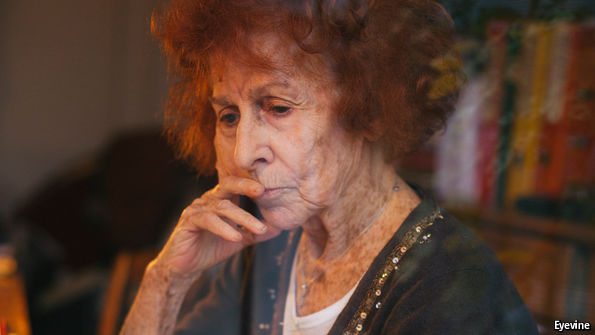
But You Did Not Come Back. By Marceline Loridan-Ivens. Translated by Sandra Smith. Faber; 100 pages; £12.99.
THIS is a small book with a big voice. It took Marceline Loridan-Ivens, a French film-maker, 70 years before she felt able to write it. At the age of 15, in April 1944, she and her father, Solomon Rozenberg, were captured in their garden in Nazi-occupied France and deported: he to Auschwitz, she to Birkenau. She returned; he never did. This is her tender, anguished, remorseful letter of love to him
The memoir is structured around the author’s failing effort to recall the words her father wrote to her in a letter, smuggled to Ms Loridan-Ivens when they were both held in the extermination camp. At the time, she was assigned to dig trenches into which gassed bodies would be dumped. His words “probably spoke to me of hope and love,” she muses: “but there was no humanity left in me…I served death. I’d been its hauler. Then its pickaxe.”
In tight, unsparing prose, she confronts the delusions her father held, and the lies she told herself. He thought owning a château in France would make him no longer a Jew in French eyes. “You didn’t really die for France,” she says to him. “France sent you to your death.” She pretended to herself for decades that the ditches she had dug were near the kitchens, not the gas chambers. Now, she confesses, wincing, she helped build a railway line that brought children to their death there. One day, an SS officer clubbed to death a young female prisoner when she and the author struggled to carry a crate of potatoes. “I think she was Greek, and I killed her,” she writes. She shut down, to keep going: “You freeze inside so you don’t die.”
In the camp, she fought to stay alive. A free woman, she tried to end her life, twice. Her family, fatherless, fell apart. Her brother and a sister later killed themselves. Ms Loridan-Ivens could not face bringing children of her own into the world. She ended up in a second marriage to a film-maker old enough, she now recognises, to be her father. Punctuated by moments of humanity, affection and even humour, there is a dreadful, cramped feel to this book, as if to reflect both the experience itself, and the author’s recollections of it. It is shot through with bleak restraint. “Surviving makes other people’s tears unbearable,” she observes. Now 87 years old, the author is still haunted by her father’s absence. Had he survived, she writes, “we could have divided our memories in two.”